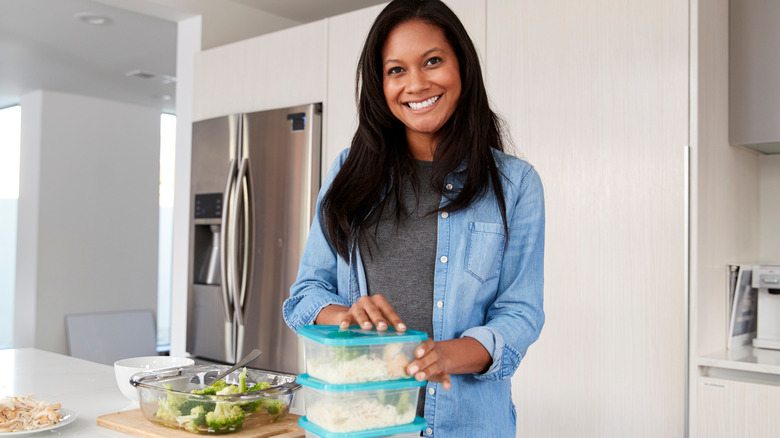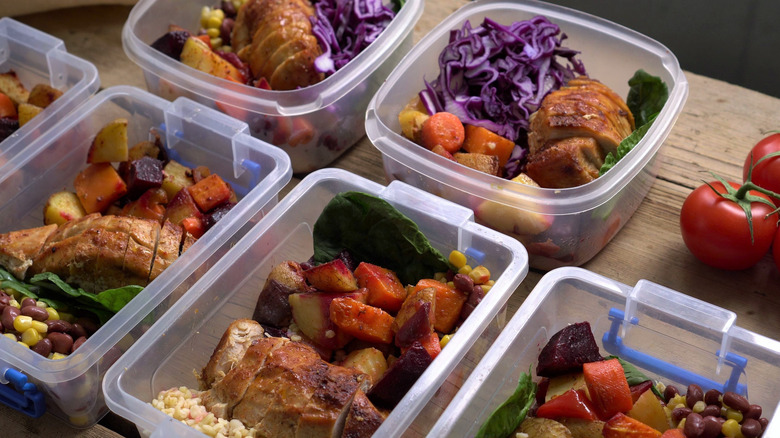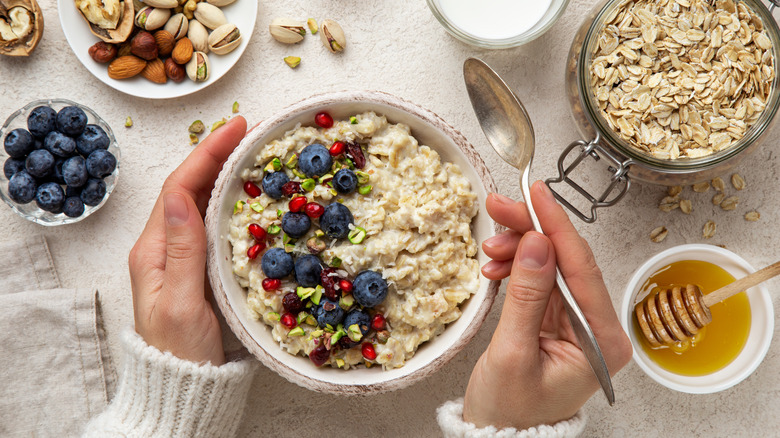The Big Mistake You're Making While Meal Prepping
Meal prepping can be a great way to free up your time and reduce food waste. It also makes it easier to stick to your diet and practice portion control. "When you don't know what to eat, or you let yourself get too hungry, you tend to eat foods you didn't plan on," Dr. Amy Shapiro explained to Real Simple. Meal prepping, instead, gives you more control over the ingredients used and can help you avoid excess sugar. For example, you can use stevia, raw honey, or mashed bananas instead of sugar when baking cookies.
Athletes and fitness models swear by meal prep for greater energy, improved performance, and better health. Strongman Terry Rady, for example, uses this strategy to save money and fuel his gains. "If you're missing meals because you have a demanding job, that's one thing. If you're missing them just because you didn't prep, you're not putting in the work," he told Bodybuilding.com. And physique competitor Allison Warrell cooks twice a week — on Wednesday and Sunday evenings. This allows her to adjust her meal plan based on her workouts and recovery goals, she said in her interview for Bodybuilding.com.
Meal prepping is both art and science. While it may seem simple, it requires some planning and a good understanding of your nutritional needs. Your lifestyle and food preferences matter, too. With that being said, here's the big mistake you're making when preparing your meals.
Trying to prepare too much is a meal-prepping mistake
While it's important to cook balanced meals and keep your diet varied, you shouldn't spend hours in the kitchen. Sure, there are thousands of delicious, healthy recipes that you could try, but you don't have to do everything at once. The key is to keep things simple. Each week, choose two or three recipes in addition to your go-to meals and then get to work.
Unless you're a professional chef, you probably lack the time and experience needed to cook all sorts of things. Even if you managed to do that, you'd probably end up with too much food. Households are responsible for over 40% of all food waste, according to Recycle Track Systems (RTS). Preparing more food than you need can also increase stress and make everything and take the joy out of meal prepping. On top of that, it's expensive and time-consuming.
"I have zero time for elaborate meal prep, so I eat for fuel, not taste — although a little hot sauce and peppers can make just about anything taste good," strongman Terry Rady told Bodybuilding.com. Rady's meals consist of chicken, brown rice, and broccoli. Physique competitor Allison Warrell has a similar approach; her meals are based on chicken, rice, and vegetables. As far as snacking goes, she prefers high-protein bars. You're not auditioning for "MasterChef" here — you're just trying to get a somewhat healthy meal on the table.
Meal prepping is as complex or as simple as you make it
When it comes to meal prepping, quality should always come first. A balanced meal, such as beef and broccoli stir fry or a vegetable frittata, can be a lot more nutritious than a fancy dish. Plus, you can always use herbs and spices to make your food taste amazing.
Take oatmeal, for example. You can make it taste sweet, salty, spicy, or everything in between, depending on the ingredients used. Add a pinch of salt to bring out the nutty flavor of the oats or mix it with quinoa for extra sweetness. You could even sprinkle paprika, cayenne pepper, or ginger on top for a spicy kick.
The same goes for poultry, beef, fish, eggs, and other everyday foods. You can change their flavor, aroma, or texture just by using different spices. Registered dietician Kelly Jones suggests stocking your pantry with hummus, tortillas, almond or peanut butter, cheese, and salad vinaigrette in addition to your go-to foods and snacks (via Kelly Jones Nutrition). These simple ingredients allow for endless food combinations, making it easier to cook delicious yet healthy meals.


